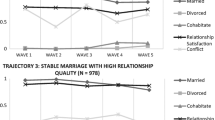Abstract.
Background:
Relationship transitions have consistently been found to be associated with mental health in young adulthood, but previous studies have not demonstrated clearly whether such relationship transitions actually precede the development of mental health problems and have focused almost exclusively on subclinical levels of problem behavior.
Methods:
Longitudinal associations between the incidence of mood, anxiety, and substance disorders (DSM-III-R) and relationship transitions during young adulthood were examined using data from 1,581 Dutch young adults aged 18–34, who participated in three waves (1996, 1997, and 1999) of a nationwide epidemiological survey.
Results:
Concurrent 3-year longitudinal associations showed that the incidence of mood and substance disorders was linked to relationship stability and change (i. e., staying single, breaking up/divorcing), but more rigorous, prospective analyses demonstrated that only the incidence of substance disorders was associated with previous relationship developments. Earlier prevalence of mood disorders increased young adults’ likelihood of subsequently experiencing a break-up/divorce and lowered the likelihood of becoming a parent, but mood disorders were in turn predicted by previously experienced relationship difficulties.
Conclusions:
Apart from the negative consequences of a break-up/divorce, having a relatively unattached relationship status (i. e., not stably cohabiting/married, not being a parent) may be an important factor in explaining the onset of substance disorders. Furthermore, results qualify the notion of de-selection in certain partner roles by mood disorders; mood disorders negatively affect individuals’ chances of staying with one’s partner, but are in turn dependent on earlier partner relationship quality.
Similar content being viewed by others
Author information
Authors and Affiliations
Corresponding author
Rights and permissions
About this article
Cite this article
Overbeek, G., Vollebergh, W., Engels, R.C.M.E. et al. Young adults’ relationship transitions and the incidence of mental disorders. Soc Psychiatry Psychiatr Epidemiol 38, 669–676 (2003). https://doi.org/10.1007/s00127-003-0689-1
Accepted:
Issue Date:
DOI: https://doi.org/10.1007/s00127-003-0689-1




